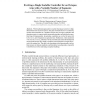Free Online Productivity Tools
i2Speak
i2Symbol
i2OCR
iTex2Img
iWeb2Print
iWeb2Shot
i2Type
iPdf2Split
iPdf2Merge
i2Bopomofo
i2Arabic
i2Style
i2Image
i2PDF
iLatex2Rtf
Sci2ools
PPSN
2010
Springer
2010
Springer
Evolving a Single Scalable Controller for an Octopus Arm with a Variable Number of Segments
Abstract. While traditional approaches to machine learning are sensitive to highdimensional state and action spaces, this paper demonstrates how an indirectly encoded neurocontroller for a simulated octopus arm leverages regularities and domain geometry to capture underlying motion principles and sidestep the superficial trap of dimensionality. In particular, controllers are evolved for arms with 8, 10, 12, 14, and 16 segments in equivalent time. Furthermore, when transferred without further training, solutions evolved on smaller arms retain the fundamental motion model because they simply extend the general kinematic concepts discovered at the original size. Thus this work demonstrates that dimensionality can be a false measure of domain complexity and that indirect encoding makes it possible to shift the focus to the underlying conceptual challenge.
Distributed And Parallel Computing | Fundamental Motion Model | General Kinematic Concepts | PPSN 2010 | Simulated Octopus Arm |
| Added | 29 Jan 2011 |
| Updated | 29 Jan 2011 |
| Type | Journal |
| Year | 2010 |
| Where | PPSN |
| Authors | Brian G. Woolley, Kenneth O. Stanley |
Comments (0)

